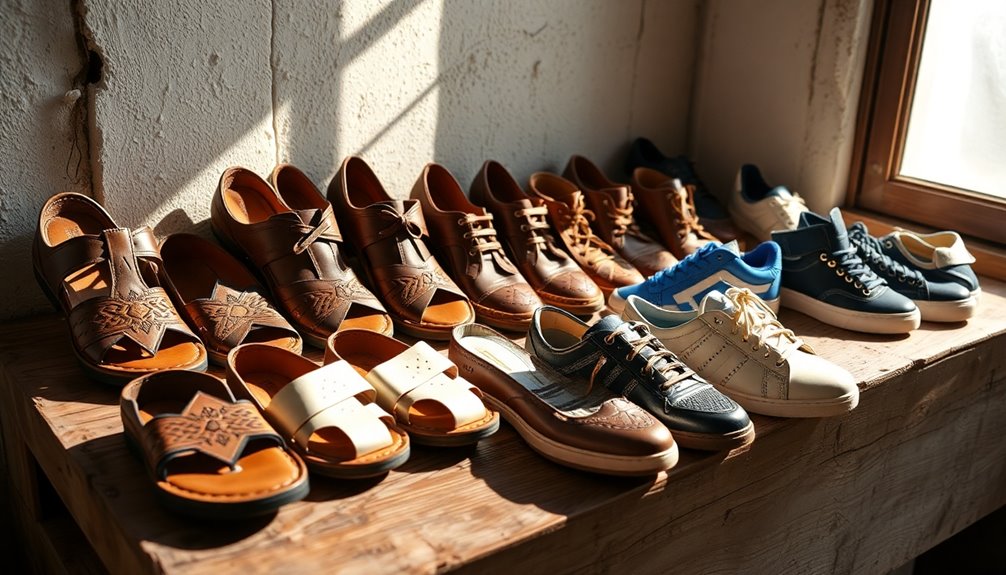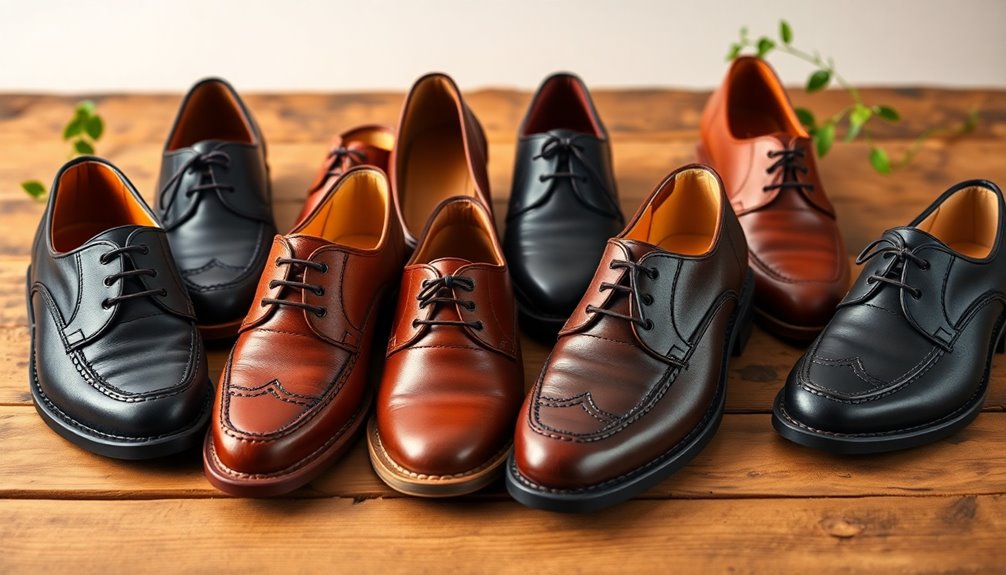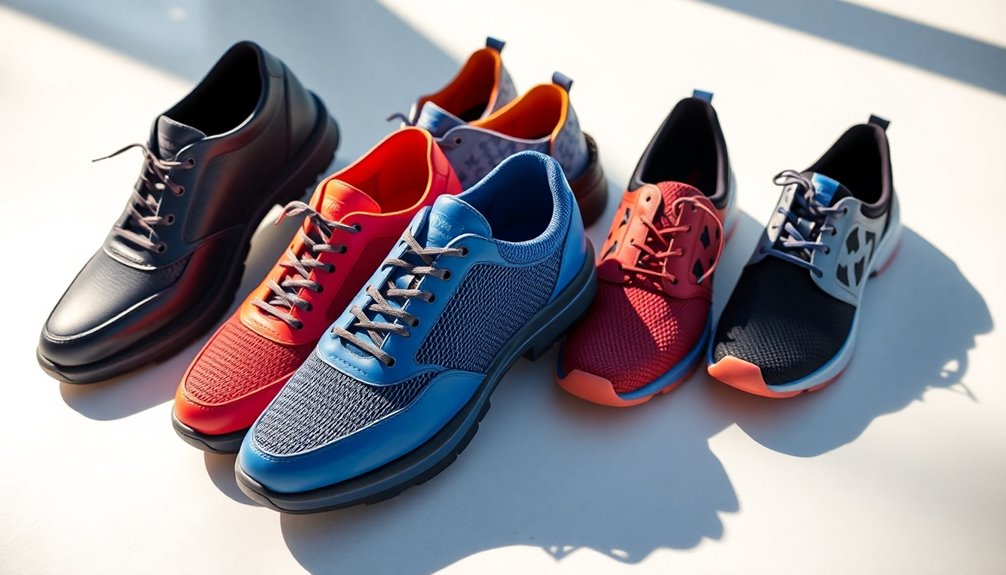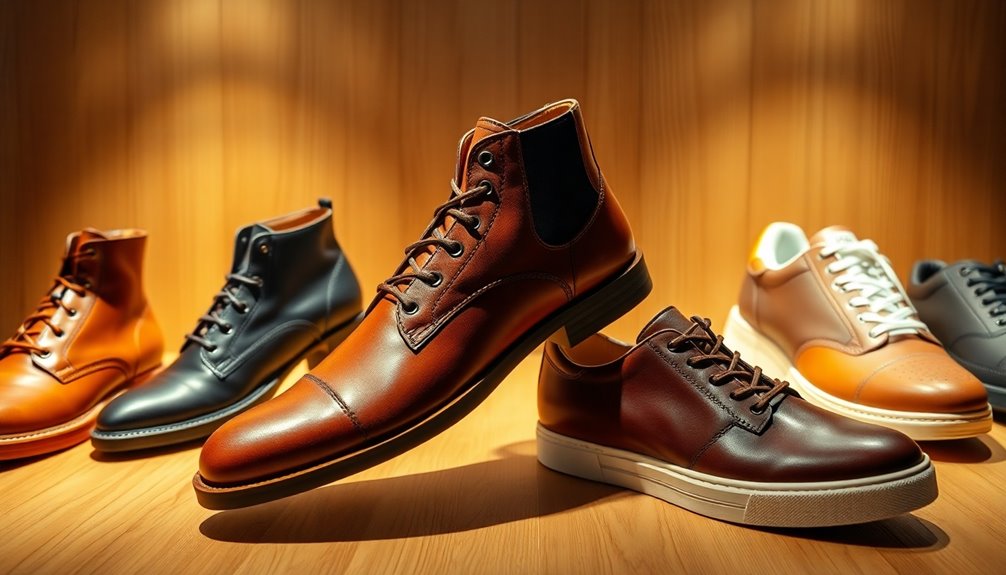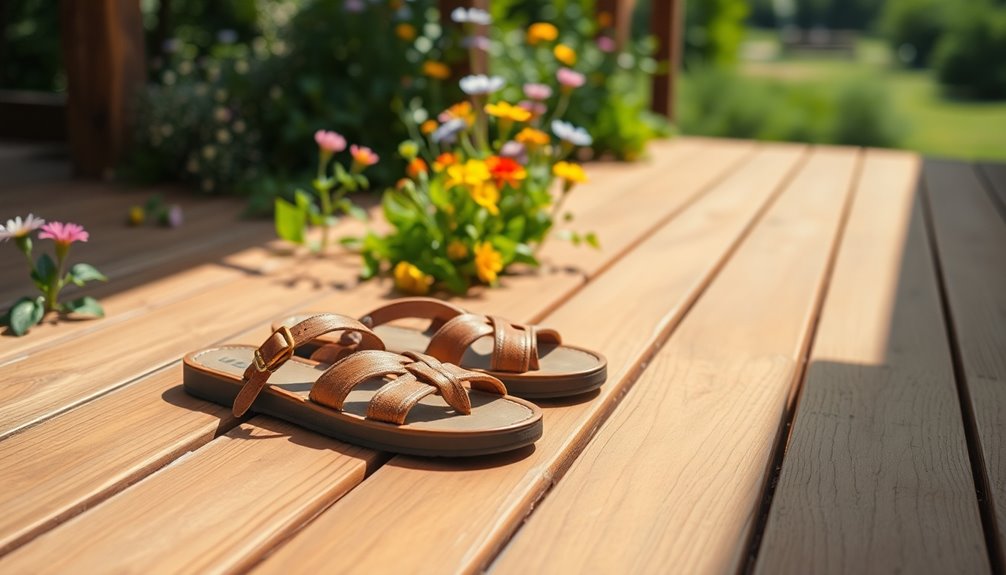Israeli shoes embody a unique fusion of innovation and tradition. You'll find a diverse selection, from classic leather to modern smart fabrics, designed for comfort and versatility. The industry's focus on sustainability, using recycled materials, shows a commitment to eco-friendly practices. Advanced manufacturing techniques enhance precision, while skilled artisans ensure quality. Moreover, the rise of casual and athletic styles reflects contemporary consumer preferences. As trends shift and the market evolves, you'll discover how Israel's footwear landscape continues to adapt. Explore further to uncover more about the traditional roots and cutting-edge innovations shaping this vibrant industry.
Key Takeaways
- Israeli footwear blends traditional craftsmanship with modern innovations, utilizing advanced technologies like smart fabrics and IoT integration in designs.
- The market emphasizes sustainability, incorporating recycled materials and eco-friendly practices into manufacturing processes to appeal to environmentally conscious consumers.
- Renowned for quality, skilled labor ensures high standards in production, despite rising costs and competition from cheaper imports.
- The rise of casual and lifestyle footwear reflects a cultural shift towards comfort and versatility, merging style with functionality.
- International trade plays a significant role, with strong export relationships, particularly to the U.S., showcasing the global appeal of Israeli shoe designs.
Overview of the Israeli Footwear Market
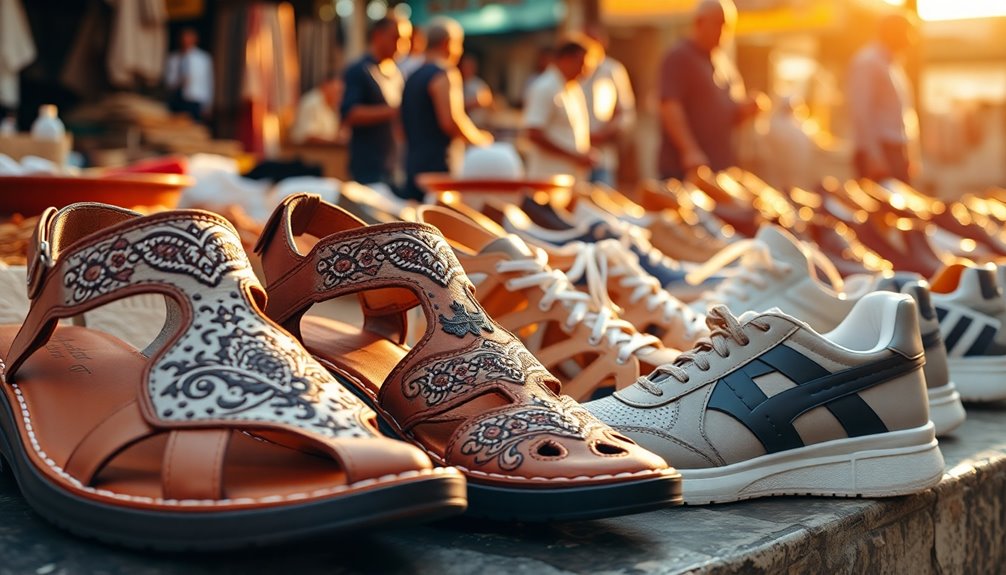
The Israeli footwear market has experienced significant fluctuations in recent years, with a notable decline of 34.7% in 2023, bringing its total value down to $401 million. This downturn interrupted a two-year rising trend, highlighting the volatility within the sector.
Despite this, eCommerce is thriving, with revenue expected to reach $448 million by 2024 and grow to $480.2 million by 2028, indicating a CAGR of 1.7% from 2024 to 2028. The shift towards online retail channels has significantly influenced consumer purchasing behavior, driving growth in this segment.
The market's offerings are diverse, ranging from traditional leather footwear to innovative designs made from textiles, plastics, and rubber. Major players like shein.com have emerged, generating substantial revenue, while staples like work shoes and army boots remain popular.
Production in Israel has faced challenges, with a modest decline in output value in 2023 after a record high in 2021. However, Israeli manufacturers are gaining recognition for their technological innovations, enhancing their reputation in the global market.
Import values have also dropped significantly, following two years of growth, while exports have seen a positive trend, reflecting a nuanced landscape for Israeli footwear as it adapts to changing consumer demands.
Trends Impacting Footwear Consumption
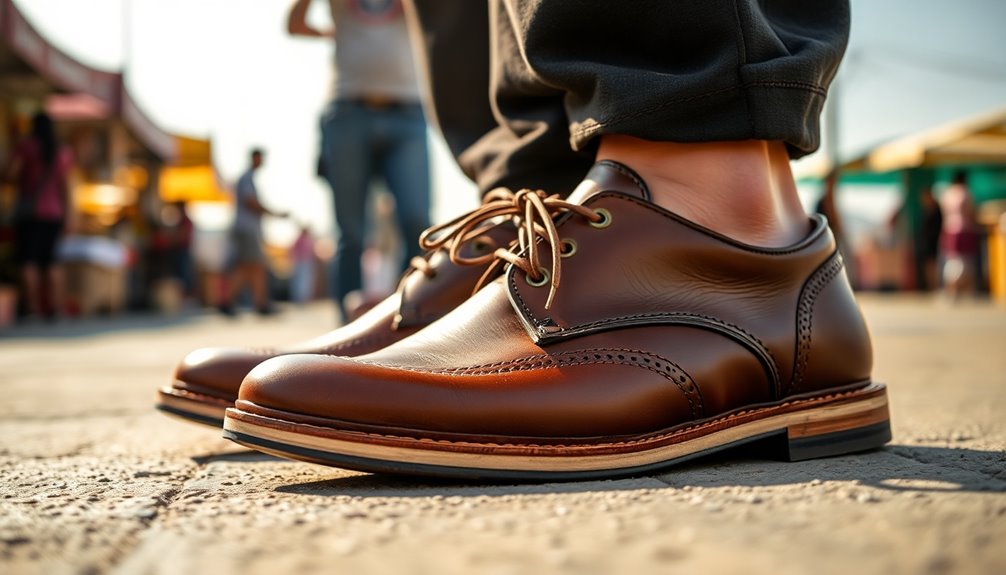
Footwear consumption is evolving rapidly, driven by changing consumer preferences and technological advancements. You might notice a significant rise in demand for casual and lifestyle footwear, as people seek comfort and versatility in their daily wear. The emphasis on health and fitness is pushing many to opt for athletic shoes that feature breathability, cushioning, and ergonomic designs. As awareness about foot health grows, consumers are increasingly prioritizing supportive footwear.
Social media and celebrity endorsements are also reshaping fashion trends, leading to a surge in the popularity of trendy and limited-edition styles. Meanwhile, eco-consciousness is prompting many to choose sustainable and eco-friendly options, reflecting a broader commitment to environmental responsibility.
On the tech side, innovations like smart fabrics and IoT integration are making waves in footwear design. Athletic shoes are recognized as a leading category supporting active lifestyles, as 3D printing allows for mass customization, while new materials derived from fruits and plants are taking the spotlight.
The market's expansion in emerging regions and the rise of e-commerce platforms are reshaping how you shop for shoes, making it easier to find the perfect pair that aligns with your lifestyle and values.
Production Insights and Challenges
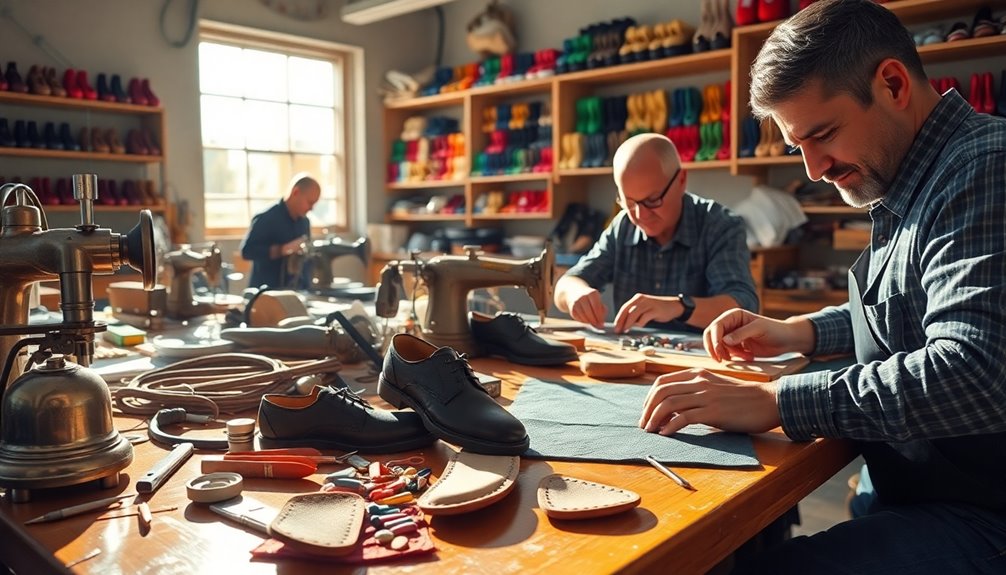
While navigating the complexities of shoe production, manufacturers in Israel face a myriad of challenges that can impact quality and efficiency. The production process begins with detailed designs crafted by implementation departments, incorporating insights from designers and technicians. High-quality materials, like Italian calf leathers, are meticulously selected based on the shoe's intended use. The commitment to quality craftsmanship is evident throughout the entire production process, ensuring each shoe meets high standards.
However, the workforce required is substantial; for instance, Conhpol needs 70 people to produce just one pair of shoes. Skilled labor plays a crucial role, with experienced shoemakers and traditional craftsmen contributing significantly. Yet, rising labor costs and competition from cheaper imports present ongoing challenges.
Automation is gradually simplifying production, but the intricate nature of shoe design still demands manual expertise. Access to essential materials can also be limited due to security restrictions, further complicating the process.
The final stages, including polishing and quality control, are vital to uphold high standards, but the threat of mass-produced shoes undermines the sustainability of traditional craftsmanship. Balancing innovation with tradition remains a delicate endeavor as the industry strives to maintain its unique identity amidst these pressures.
The Role of Imports and Exports
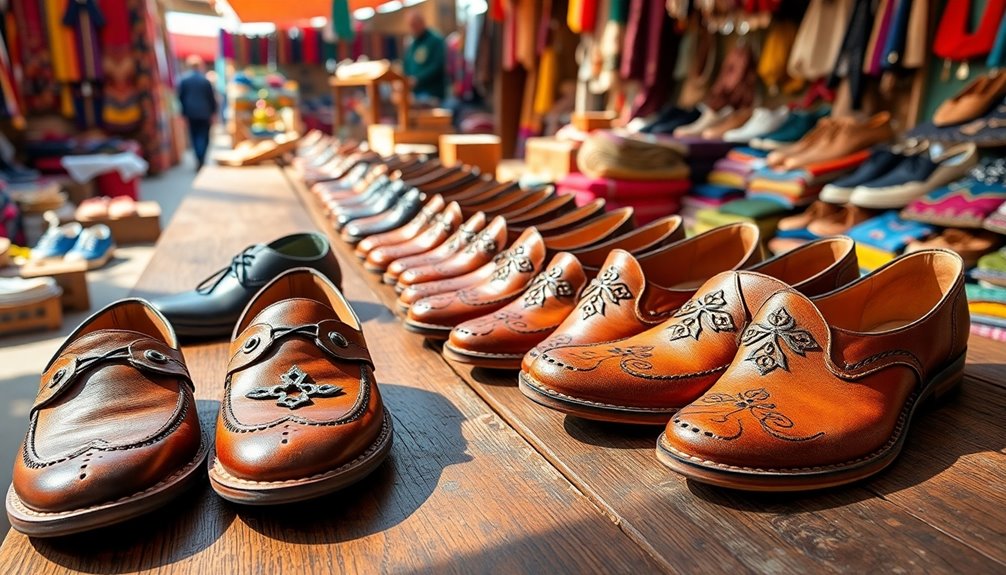
Israel's shoe industry thrives on a dynamic interplay of imports and exports that shapes its market landscape.
You'll find that the country heavily relies on imports from key players like China and the United States. In 2022, China led with $14.4 billion in shoe imports, while the U.S. followed with $11.6 billion. This influx not only diversifies the product range but also meets the growing demand for foreign goods in Israel. Additionally, the overall exports totaled $76.9B in 2022 trade data, showcasing the significance of international trade to the economy.
On the export side, the U.S. is a major destination for Israeli shoes, receiving $20.3 billion in 2022. The industry exports a variety of goods, including machinery and leather products, which contribute significantly to revenue.
Overall, Israeli exports have surged by $15.6 billion from 2017 to 2022, showcasing a robust export market.
However, the trade dynamics reveal a trade deficit with the U.S. that increased by 24.1% in 2022. This indicates a greater appetite for imports compared to exports.
The interplay of these imports and exports not only fuels the growth of Israel's shoe industry but also reflects the evolving global market landscape.
Innovations in Shoe Manufacturing
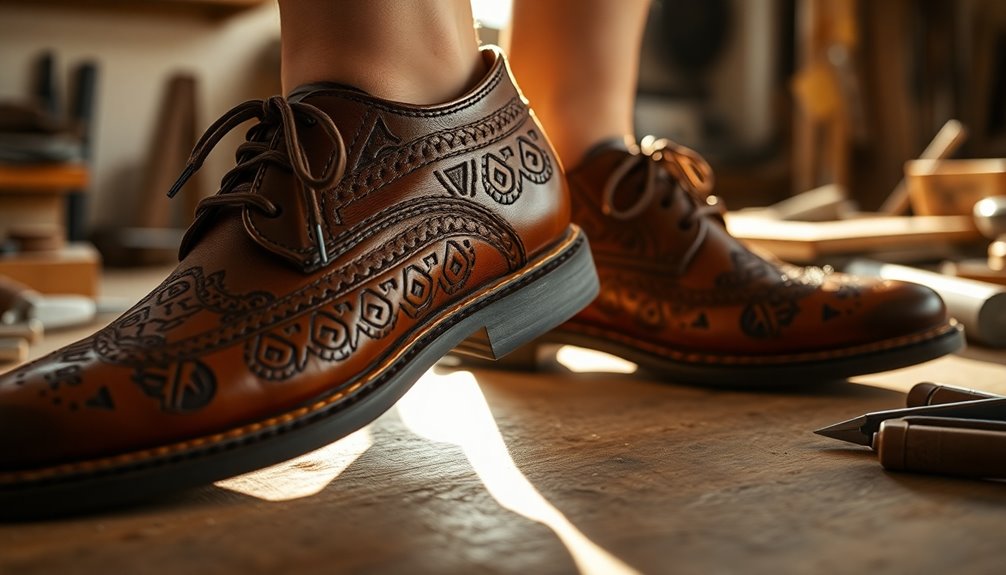
The vibrant interplay of imports and exports has set the stage for groundbreaking advancements in shoe manufacturing.
You'll find that Israeli brands are at the forefront, integrating advanced technologies into their designs. For instance, B-Shoes come equipped with internal processors that collect user data, helping to prevent falls and improve balance. Pressure sensors embedded in the sole detect the center of pressure, adjusting the shoe's position for enhanced stability. These innovations are particularly crucial as 1 in 3 older adults experience falls annually in the U.S.
Sustainability is also a major focus. Companies are using recycled plastic to create yarn and fabrics, while organic cotton and materials like hemp and cork are becoming more common. You can even find shoes made from fully compostable materials, like BioCir, thanks to 3D printing technology pioneered by startups like Balena.
Innovative manufacturing processes enhance precision and customization, utilizing computer-controlled cutting and injection molding techniques.
The shift towards circular design means that brands are developing shoes that are easy to dismantle and recycle, significantly reducing waste. With a commitment to eco-friendly practices, the industry isn't just innovating for performance but also for a sustainable future.
Key Players in the Market
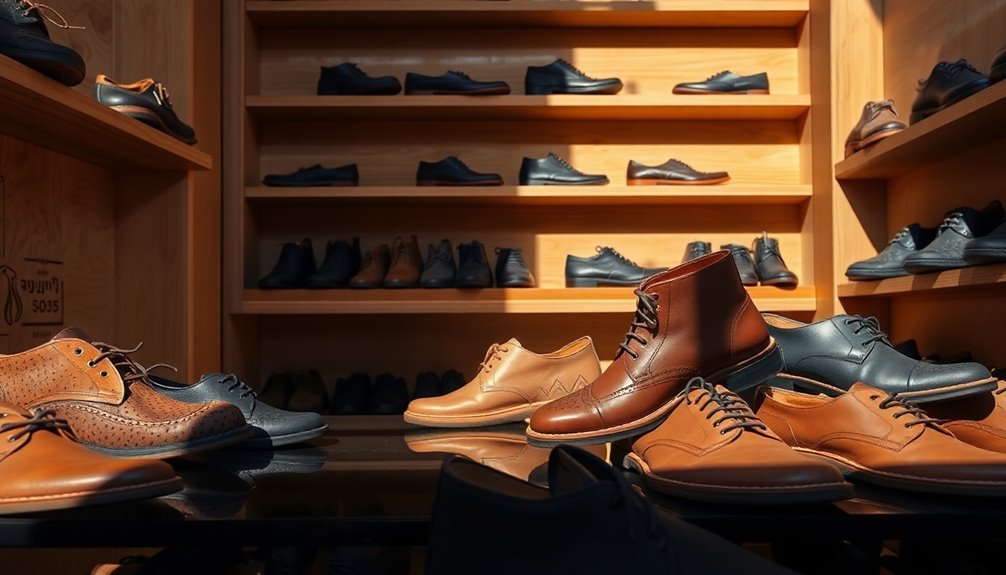
In the competitive landscape of the Israeli footwear market, major players are continually stepping up their game to capture consumer attention. Nike leads with a 6.1% market share, followed by Adidas at 3.6%. Call It Spring holds a solid third place with 4.3%, showing that established brands face stiff competition from both local and international rivals.
ASICS, TOGO, Aldo, Skechers, Steven Madden, and Tamnoon also contribute to the dynamic market. The rise of e-commerce growth has become a significant factor in reshaping how consumers shop for footwear. As brands adapt to online channels, they must also consider trading strategies that optimize their market presence.
Distribution channels are evolving, with online sales gaining traction. While apparel and footwear specialists still dominate, brick-and-mortar stores are losing ground to e-commerce. This shift makes it essential for brands to adapt quickly to changing consumer preferences. New entrants are primarily targeting the sports footwear segment, intensifying competition for established brands like Nike and Adidas. Smaller brands, including Call It Spring, are aggressively vying for market share, proving that innovation and adaptation are key in this landscape.
Despite economic challenges affecting consumer spending in 2023, the market's projected growth indicates that savvy players can still thrive. Understanding these dynamics will be crucial for anyone looking to navigate the Israeli footwear market successfully.
The Rise of Sports Footwear
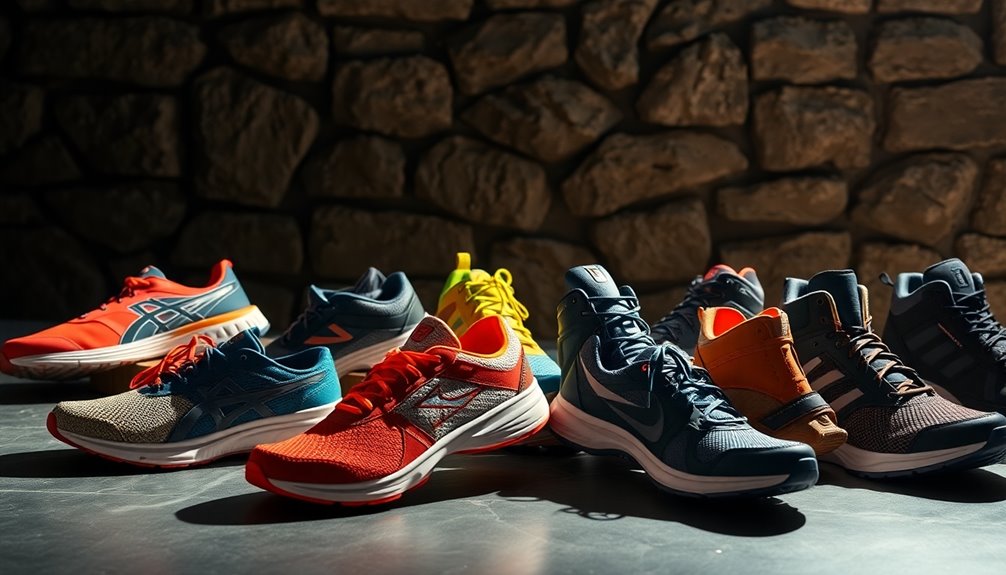
Driven by a growing emphasis on health and wellness, sports footwear has surged in popularity among consumers. You'll notice that more people are prioritizing athletic and performance footwear, seeking options that align with their active lifestyles. The trend towards lightweight, partially minimal shoes reflects a desire for comfort without sacrificing support. Runners, in particular, are gravitating toward footwear that promotes natural foot motion, influencing brands to innovate and adapt. As the market evolves, hybrid models are emerging to address injury concerns associated with minimal footwear, providing a perfect blend of support and flexibility. You'll find that men's footwear in Israel is projected to grow significantly, with estimates suggesting a CAGR of 5.5% by 2025. Notably, the focus on innovation in footwear design is driving brands to enhance performance and sustainability, attracting a broader consumer base. Additionally, incorporating fiber-rich foods into one's diet supports overall health and athletic performance. Furthermore, many athletes are turning to natural remedies for recovery, emphasizing the connection between holistic health and athletic success. In addition, the shoes and boots category is set to dominate sales, becoming the fastest-growing segment in the market. Despite some anticipated slowdowns due to economic challenges, the overall apparel market in Israel is expected to maintain a steady growth rate of 5.3% until 2025. Embrace these trends as they reflect a broader shift toward health-conscious choices and innovative designs in the sports footwear landscape.
Online Sales Growth and Trends
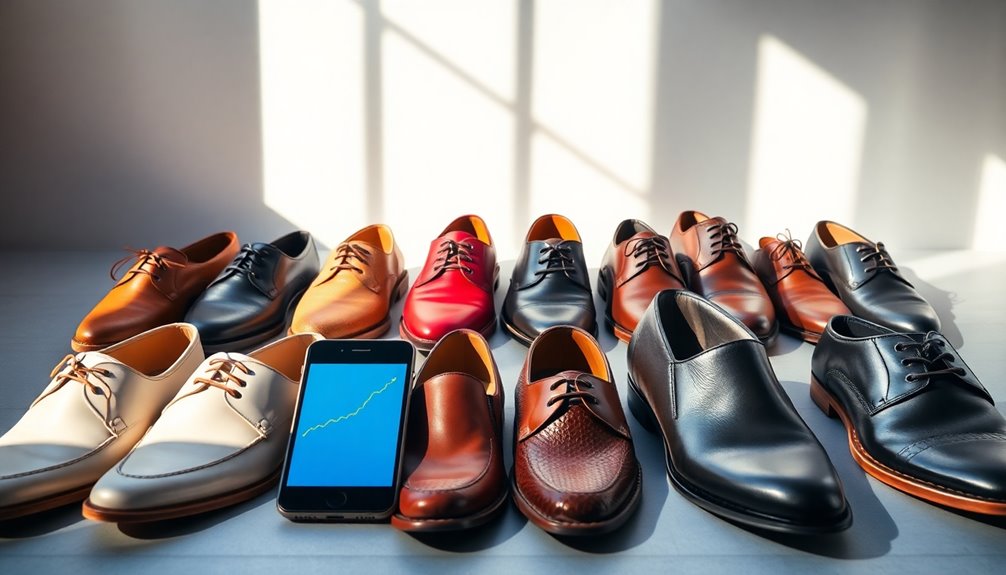
Online sales in Israel have skyrocketed, especially during the pandemic, marking an impressive 85% growth that outpaced the global average. This surge started from a relatively lower base of online shopping, indicating a significant shift in consumer behavior.
While there's a high interest in local sites, only 40% of purchases are completed there, revealing a gap between search and actual buying behavior.
Delivery time plays a crucial role in this landscape—65% of you're willing to pay extra for faster delivery. In fact, speedy delivery has overtaken free shipping as the top priority for consumers.
The Israeli footwear eCommerce market is projected to grow from US$448.0 million in 2024 to US$480.2 million by 2028, with footwear accounting for 27.3% of the fashion eCommerce sector. Monthly revenue trends show recent jumps from US$25 million to US$35.4 million, indicating a solid 6.0% growth, underscoring the increasing traction of online shopping.
As you navigate this competitive market, understanding these trends can help you make informed decisions and enhance your shopping experience.
Consumer Preferences and Behavior
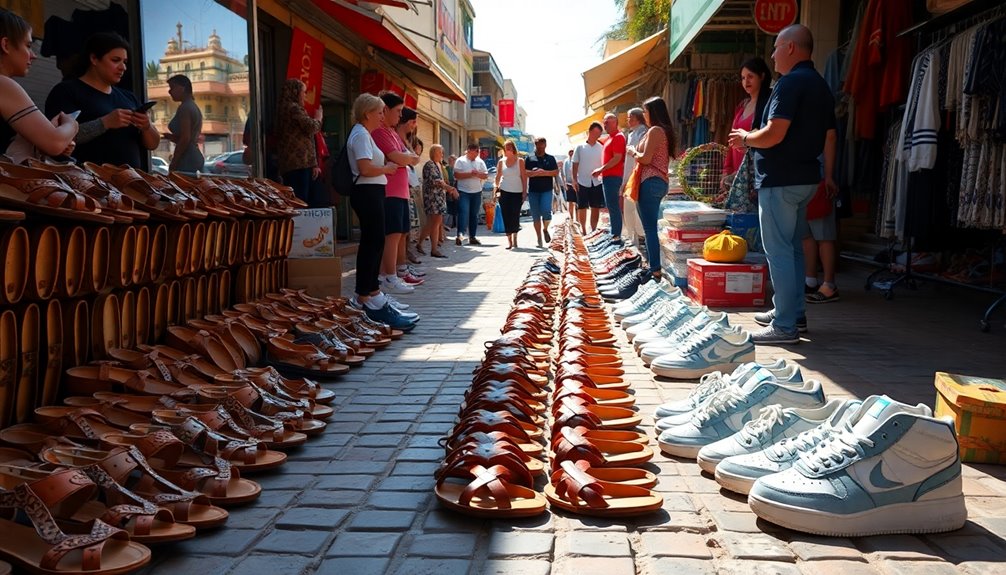
Recognizing the shift toward comfort and casual styles, Israeli consumers increasingly prefer footwear that blends practicality with style. You'll find that brands like Naot, Shoresh, and Blundstone dominate the market due to their focus on comfortable, functional designs. Traditional models, such as biblical sandals, remain iconic, reflecting a strong sense of national identity. As health and wellness trends take center stage, you're likely to see a rising demand for sports footwear. More people are engaging in active lifestyles, prompting local brands to innovate. They're crafting shoes that balance comfort with support, making them ideal for exercise and outdoor activities. Additionally, the popularity of Teva Naot's handmade soles is a testament to the growing preference for quality craftsmanship. Minimalist and barefoot shoes are also gaining popularity, with brands like Belenka and Softstar catering to this growing interest. Local manufacturers emphasize natural materials, like Naot's cork and latex components, ensuring quality craftsmanship that resonates with consumers. International brands like adidas and Nike are making their mark, but local brands are stepping up to compete, focusing on unique designs that reflect both tradition and modernity.
Economic Factors Influencing the Market
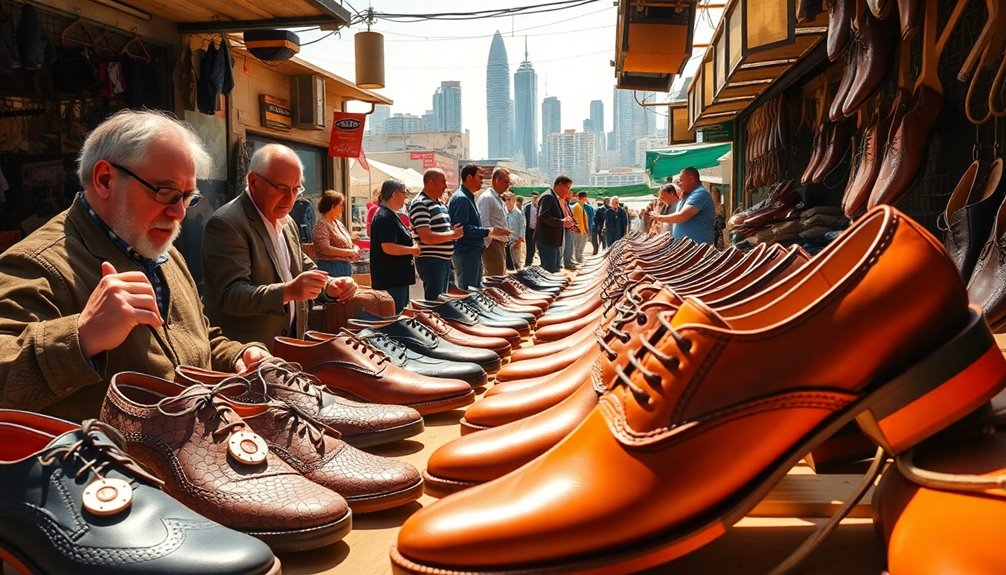
Economic factors play a crucial role in shaping the Israeli shoe market. High inflation and rising interest rates are squeezing your disposable income, making you less likely to invest in non-essential items like footwear.
Political unrest and judicial disputes also dampen consumer confidence, impacting market stability. Additionally, manufacturers face increased operational costs due to rising electricity prices, higher minimum wages, and escalating rents.
The depreciation of the shekel against the US dollar adds to the burden for importers, as many brands operate in dollars. Global economic pressures, including widespread inflation and potential recessions, further strain the market. The majority of brands in Israel pay for imports in US dollars, which exacerbates the cost challenges they face.
Competition is heating up with new international entrants like Alo Yoga and Lululemon, particularly in the sportswear sector. This intensifies the battle for market share against established brands like adidas and Nike.
The shift to online sales is also significant, as more consumers prefer shopping online, which challenges traditional retail.
To stay competitive, you'll notice brands focusing on sustainability and competitive pricing.
Frequently Asked Questions
What Are the Historical Influences on Israeli Shoe Design?
When you explore Israeli shoe design, you'll find a rich blend of historical influences.
Early kibbutz culture shaped practical, simplistic styles to align with socialist values. Ancient sandals inspire modern designs, connecting wearers to Israel's biblical heritage.
Family traditions from European shoemakers, like Josef Rosenblith, further innovate the craft. Sandals evolved as a symbol of national identity, reflecting a desire for simplicity, practicality, and a connection to both past and present cultural narratives.
How Do Traditional Israeli Shoes Differ From Modern Styles?
Traditional Israeli shoes, like the classic two-strap sandals, focus on simplicity and natural materials, often handcrafted by local artisans.
In contrast, modern styles incorporate advanced materials and patented designs for enhanced comfort and durability.
You'll notice features like non-slip soles and trendy aesthetics in today's footwear, appealing to a broader audience.
While traditional designs emphasize historical significance, modern styles reflect innovation and a global market presence.
What Sustainable Practices Are Footwear Brands Adopting in Israel?
Footwear brands in Israel are adopting several sustainable practices.
They're using biodegradable materials, like BioCir, which decompose without harmful waste. Many brands implement green chemistry for production, ensuring water-based solutions and reducing VOC emissions.
Automated systems streamline manufacturing, while 3D printing minimizes waste. Brands also focus on circular economy practices, encouraging shoe return for composting.
With growing consumer demand for eco-friendly options, these brands strive to make sustainability accessible and innovative.
Are There Specific Cultural Events Influencing Footwear Trends in Israel?
Yes, specific cultural events greatly influence footwear trends in Israel. During holidays like Passover and Yom Kippur, you'll notice traditional styles gaining popularity, reflecting the significance of the occasion.
Additionally, fashion weeks and local festivals showcase new designs, blending modern influences with cultural heritage. As you explore these events, you'll find that seasonal trends often emerge, driven by both the climate and the vibrant Israeli lifestyle, making sandals a staple choice.
How Has Israeli Footwear Adapted to Meet Diverse Consumer Needs?
Israeli footwear has adapted remarkably to meet diverse consumer needs by incorporating cultural elements into its designs.
You'll find special lines catering to local customs, like Sabbath-friendly sportswear. Brands often collaborate with local designers to create exclusive products that resonate with various communities.
This attention to cultural nuances not only boosts brand loyalty but also ensures that you get footwear that's both functional and reflective of your lifestyle and values.
Conclusion
In conclusion, the Israeli footwear market uniquely blends innovation with tradition, reflecting the dynamic trends and consumer preferences shaping its landscape. As you explore the rise of sports footwear and the growth of online sales, you'll see how economic factors and production insights influence this vibrant industry. Embracing both heritage and modernity, Israeli shoes not only cater to diverse tastes but also stand as a testament to the country's commitment to quality and creativity in footwear.
